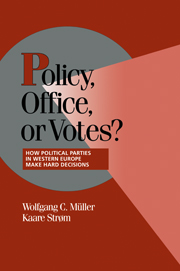Book contents
- Frontmatter
- Contents
- Figures
- Tables
- Contributors
- Chapter 1 Political Parties and Hard Choices
- Chapter 2 Office, Votes, and Then Policy: Hard Choices for Political Parties in the Republic of Ireland, 1981–1992
- Chapter 3 Party Behaviour and the Formation of Minority Coalition Governments: Danish Experiences from the 1970s and 1980s
- Chapter 4 From Policy-Seeking to Office-Seeking: The Metamorphosis of the Spanish Socialist Workers Party
- Chapter 5 Changing Strategies: The Dilemma of the Dutch Labour Party
- Chapter 6 Party Behavior in a Polarized System: The Italian Communist Party and the Historic Compromise
- Chapter 7 Decision for Opposition: The Austrian Socialist Party's Abandonment of Government Participation in 1966
- Chapter 8 Leadership Accountability and Bargaining Failure in Norway: The Presthus Debacle
- Chapter 9 Winner Takes All: The FDP in 1982–1983: Maximizing Votes, Office, and Policy?
- Chapter 10 Trade-offs in Swedish Constitutional Design: The Monarchy under Challenge
- Chapter 11 Parliamentary Rules and Party Behavior during Minority Government in France
- Chapter 12 Conclusions: Party Behavior and Representative Democracy
- Index
- Titles in the series
Chapter 8 - Leadership Accountability and Bargaining Failure in Norway: The Presthus Debacle
Published online by Cambridge University Press: 05 May 2010
- Frontmatter
- Contents
- Figures
- Tables
- Contributors
- Chapter 1 Political Parties and Hard Choices
- Chapter 2 Office, Votes, and Then Policy: Hard Choices for Political Parties in the Republic of Ireland, 1981–1992
- Chapter 3 Party Behaviour and the Formation of Minority Coalition Governments: Danish Experiences from the 1970s and 1980s
- Chapter 4 From Policy-Seeking to Office-Seeking: The Metamorphosis of the Spanish Socialist Workers Party
- Chapter 5 Changing Strategies: The Dilemma of the Dutch Labour Party
- Chapter 6 Party Behavior in a Polarized System: The Italian Communist Party and the Historic Compromise
- Chapter 7 Decision for Opposition: The Austrian Socialist Party's Abandonment of Government Participation in 1966
- Chapter 8 Leadership Accountability and Bargaining Failure in Norway: The Presthus Debacle
- Chapter 9 Winner Takes All: The FDP in 1982–1983: Maximizing Votes, Office, and Policy?
- Chapter 10 Trade-offs in Swedish Constitutional Design: The Monarchy under Challenge
- Chapter 11 Parliamentary Rules and Party Behavior during Minority Government in France
- Chapter 12 Conclusions: Party Behavior and Representative Democracy
- Index
- Titles in the series
Summary
INTRODUCTION
Party politics can be spectacular popular entertainment. Regardless of whether they ultimately act out a tragedy or a comedy, party politicians occasionally grip the public's attention in powerful ways. Even the most prosaic of bills can at times set the stage for a parliamentary drama. Such was the case when the Norwegian parliament, the Storting, debated the government's farm bill in the hectic days of June 1987. I shall refer to these events as the Presthus debacle, in reference to Conservative leader Rolf Presthus, the man whose life was most severely affected by this dramatic fiasco of interparty bargaining.
This chapter analyzes the strange events that led to the Presthus debacle. These events are interesting for a number of reasons. First, the strategic moves that were made led to an outcome that none of the principal players preferred and few anticipated. Four parties explicitly committed to a change of government and collectively a legislative majority twice failed to oust a minority Labor government. The Presthus debacle shows that parties differ in the objectives they bring to coalition bargaining. In explaining such differences, we have to consider the constraints of within-party politics, and especially the consequences of different intraparty delegation regimes.
PRESTHUS AND THE EVENTS OF JUNE 1987
On Monday, June 8, 1987, Rolf Presthus was widely expected to become prime minister of Norway within a few short days.
- Type
- Chapter
- Information
- Policy, Office, or Votes?How Political Parties in Western Europe Make Hard Decisions, pp. 192 - 215Publisher: Cambridge University PressPrint publication year: 1999

